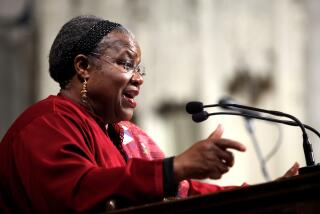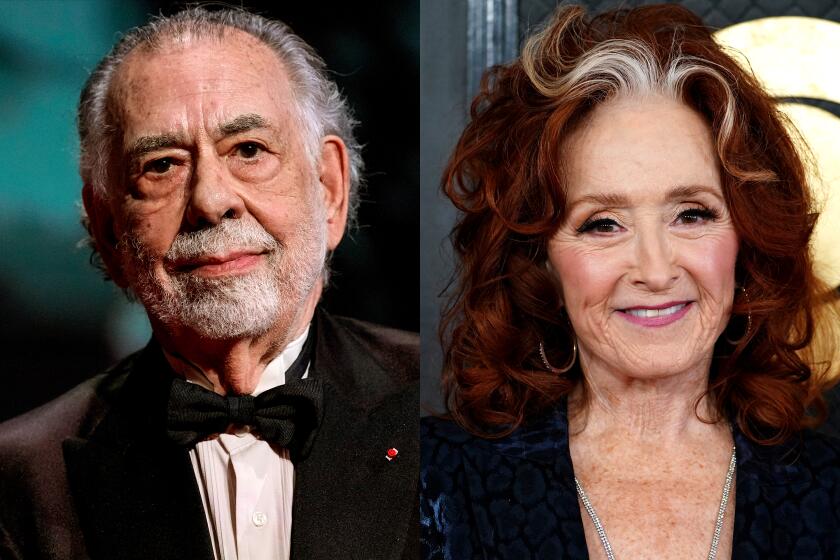The Battle Over Pop Censorship Moves to Texas : Law: A San Antonio store owner will be tried for the sale of a 2 Live Crew album. The case differs from the one in Florida because of allegations of prior restraint.
The pop music obscenity battle moves from Florida to Texas today with jury selection scheduled to begin in the Bexar County trial of Hogwild Records store owner Dave Risher.
Risher was charged with violating Texas obscenity penal codes on June 28 after he sold a copy of 2 Live Crew’s raunchy rap record “As Nasty as They Wanna Be” to the 20-year-old son of San Antonio’s leading anti-pornography crusader. If convicted, the 36-year-old retailer faces a maximum penalty of one year in jail and a $2,000 fine.
But the commercial obscenity case in San Antonio is not simply a rehash of the 2 Live Crew controversy in Florida. From its inception, Risher’s prosecution has been dogged by serious allegations of prior restraint and what the defense calls “outrageous government conduct.”
Last summer, the tactics employed by San Antonio police to encourage retailers to stop selling the album generated a wave of criticism throughout the music industry. Even John Jolley, the attorney who won the obscenity ruling against 2 Live Crew’s album in Ft. Lauderdale, blasted the vice squad’s actions as prior restraint.
Prior restraint of speech occurs when the government seeks to prohibit expression in advance of publication. “The charges against me are weird, unbelievable and patently ridiculous,” Risher said in a phone interview from his San Antonio apartment. “I violated no law. No judge or jury in my community ever ruled that 2 Live Crew’s record was obscene before I was charged.”
The Texas 2 Live Crew controversy began last May when Citizens Against Pornography director Teresa Weaver contacted vice commander Lt. Jerry Pittman regarding the explicit content of the “Nasty” recording.
“This music blatantly promotes physical degradation and sexual abuse of females,” Weaver said in phone interview from San Antonio. “I believe the Constitution guarantees me the same right to speak out against the sale of this album as much as Mr. Risher believes it grants him the right to sell it. A complaint needed to be initiated in order to determine the obscenity issue, so that’s what we did.”
Weaver provided Pittman with transcriptions of the “Nasty” album obtained from Florida attorney Jack Thompson and the Pomona-based media watchdog group, Focus on the Family, and informed him that the product was readily available at retail outlets throughout San Antonio.
Under Texas law, retailers must be aware that the material they are selling is obscene before they can be charged with a violation.
Pittman sent a copy of the “Nasty” tape to the Bexar County district attorney’s office, requesting authorities to issue a letter indicating the album was obscene. But Michael Schill, head of the misdemeanor section in the district attorney’s office, refused to draft such a document.
On June 12, Pittman ordered officers from his vice unit to visit each record retail outlet in the area which stocked the album. Store owners were asked to sign a statement drafted by the police which read, in part, “I have been made aware of the obscenities contained in the album, cassettes, compact discs, tapes or other records titled 2 Live Crew, “As Nasty as They Wanna Be.”
Most record stores in San Antonio--including Sound Warehouse and Hastings Records--the area’s two dominant retail chains, yanked the product from their shelves. But Risher refused to sign the document or stop selling the tape.
“I’ll be damned if I’m going to let some policeman walk into my record store and tell me what I can or cannot sell,” said Risher. “I thought, hey, somebody in this country has to stand up for what’s right, don’t they?”
On June 20, Weaver and her family staged a sting at Risher’s record store. Weaver’s son and husband each purchased a copy of the “Nasty” tape and immediately turned the evidence over to Pittman’s office. Pittman authorized processing of the paperwork on Weaver’s complaint and prepared the case for the district attorney’s office.
Weaver, who credits her organization’s anti-pornography campaign with shutting down more than three dozen sexually oriented businesses since 1987, said she is pleased that the case is finally going to trial.
“Either way the jury rules, we win,” Weaver said. “If the tape is ruled obscene, then retailers will not be allowed to sell it. If it is deemed not obscene, the demand for the product will diminish. How can we lose?”
Although he had hoped for more support from the industry, Risher said he is not sorry he took a stand.
“I guess this was a political act on my part,” Risher said. “I am not a rap music fan by any stretch of the imagination. In fact, I have never even listened to the 2 Live Crew tape that I was arrested for selling.
“I fought back to preserve what I perceive are my rights as a U.S. citizen. In the end, it’s the Constitution that stands to lose the most in the pop music obscenity battle.”
More to Read
The biggest entertainment stories
Get our big stories about Hollywood, film, television, music, arts, culture and more right in your inbox as soon as they publish.
You may occasionally receive promotional content from the Los Angeles Times.






